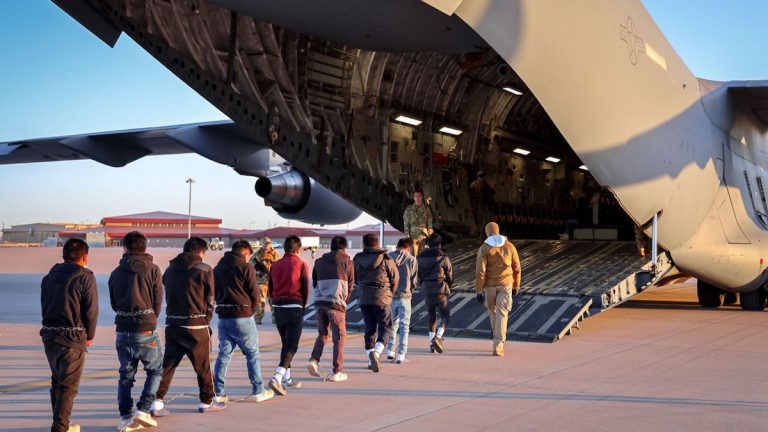
New York, N.Y. — It was a cold January morning when the first U.S. planes carrying migrants arrived at Mexico City International Airport. The Mexican government, having been briefed just 24 hours earlier, issued a stark refusal: “We will not accept any individuals deported under these terms.” The president of Mexico addressed the press, calling the policy “inhumane” and asserting that the U.S. administration had failed to provide adequate documentation of the individuals’ origins. “We are not a dumping ground for displaced people,” he declared, his tone sharp with defiance.
The Northern Triangle Pushes Back
In Honduras, the president faced a delicate balancing act. U.S. aid constituted a substantial portion of his country’s budget, but the deportation flights presented an unprecedented crisis. His government released a statement rejecting the planes on humanitarian grounds, arguing that the U.S. policy exacerbated the hardships his nation was already facing. El Salvador and Guatemala quickly followed suit, with leaders framing their refusals as a stand against the violation of international norms.
Venezuela and Nicaragua Unite
President Daniel Ortega of Nicaragua, long critical of U.S. policies, seized the moment to denounce the deportations as “imperial overreach.” He refused to accept any planes, stating, “These are not our people. We do not even have the capacity to house the citizens currently within our borders.” Similarly, Venezuela’s President, embattled by economic sanctions, called the deportations a “humanitarian atrocity” and threatened to escalate tensions by closing the Venezuelan airspace to U.S. aircraft.
The Caribbean’s Bold Move
In Haiti, where migrants were often forcibly returned, Prime Minister Laurent faced mounting domestic unrest. “We cannot bear the burden of returning citizens who left decades ago in search of a better life,” Laurent said. The government issued an official rejection of deportation flights, citing a lack of resources and the deep trauma inflicted on those being forcibly removed. Cuba’s leadership joined in solidarity, refusing entry to any deported individuals without ironclad proof of their Cuban nationality.
Africa and Asia Push Back
From Nigeria to Senegal, African leaders voiced their disapproval. Nigeria’s President argued that the U.S. was shirking its responsibility under international law, stating, “This policy treats human beings as pawns in a geopolitical game.” Senegal, a long-time ally of international human rights organizations, refused to accept any deportees, citing the lack of due process in the U.S. removals.
In Asia, India and China—geopolitical giants often at odds—unexpectedly aligned on the issue. India’s Ministry of External Affairs declared that the deportations violated global norms on the treatment of migrants. China’s Foreign Ministry took a harder stance, accusing the U.S. of “shifting blame for its domestic challenges onto other nations.”
Indonesia, meanwhile, was the most surprising addition to the list of dissenting nations. With its vast archipelago and growing migrant communities abroad, Jakarta rejected the flights outright, citing logistical challenges and concerns over the authenticity of deportation claims.
The Global Impasse
As the deportation planes remained grounded at U.S. military bases, the Trump administration faced mounting criticism. Domestic protests erupted, with activists denouncing the human rights violations tied to mass deportations. International organizations like the United Nations and Amnesty International condemned the U.S. policy as a violation of human dignity, with the Secretary-General calling for an emergency session of the U.N. General Assembly.
In Washington, political allies of the administration scrambled to justify the policy. U.S. officials attempted to broker bilateral agreements, offering aid packages and trade concessions in exchange for cooperation. Yet, the refusals from foreign governments were resolute. Even U.S.-friendly nations, fearing backlash from their citizens, refused to bend.
A Turning Point
As the weeks stretched into months, the crisis deepened. The sight of grounded planes and displaced migrants became a visual symbol of international defiance against unilateral action. The issue underscored the limits of U.S. power in a multipolar world and revealed the strength of global solidarity against perceived injustice.
In the end, the deportation policy faltered under its own weight. International pressure, combined with domestic opposition, forced the administration to scale back its ambitions. The episode became a case study in the complexities of migration and sovereignty, leaving behind a sobering lesson: borders may define nations, but humanity transcends them.
When Borders Close: Global Fallout of Trump’s Migrant Crackdown (Jan. 20, 2025)